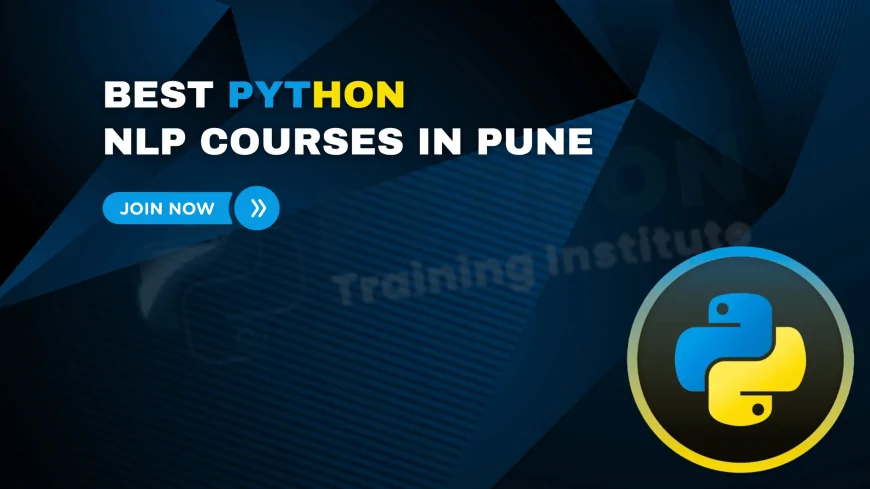Best Python NLP (Natural Language Processing) Courses Pune | Python-Based NLP Certification Courses in Pune
highlights key selling points—core NLP libraries, flexible delivery modes, placement assurance, experienced instructors, and lifetime access—directly drawn from WebAsha’s own messaging training.

Table of Contents
- Introduction
- Why NLP Courses Are Important
- Who Should Enroll in Python NLP Courses?
- Top Python NLP Courses in Pune
- Course Comparison Table
- Key Topics Covered in NLP Courses
- Career Opportunities After NLP Training
- Certifications & Real-World Projects
- Online vs Offline NLP Courses in Pune
- How to Choose the Right NLP Course in Pune
- FAQs
- Conclusion
Introduction
Natural Language Processing (NLP) is one of the most fascinating and fast-growing domains in AI, where Python is the leading language of implementation. With Pune evolving into a tech hub, the demand for skilled NLP professionals is soaring across industries—healthcare, finance, edtech, e-commerce, and more.
Why NLP Courses Are Important
Bridge Human-Computer Communication
NLP allows machines to understand and generate human language—making digital interactions more intuitive. From voice assistants like Siri or Alexa to text-based chatbots, NLP enables natural language interfaces .
Unlock Insights from Unstructured Data
Most organizational data—emails, social media, reviews—exists in text form. NLP empowers you to extract sentiment, keywords, and trends, turning chaos into actionable intelligence .
Drive Automation & Boost Efficiency
Want to streamline support or document workflows? NLP empowers bots to answer questions, route tickets, summarize documents, and more—improving speed and accuracy while reducing manual workload .
Play a Key Role in AI & ML
NLP is integral to broader Artificial Intelligence. Whether you're building language models or using frameworks like Hugging Face or BERT, understanding NLP means tapping into the core of AI innovations .
Spearhead Innovation in Real-World Projects
Mastering NLP techniques (tokenization, sentiment analysis, entity recognition) through Python libraries like NLTK, spaCy, and Transformers equips you to deploy real-world solutions—from chatbots to custom summarizers .
Expand Career Opportunities
NLP skills open doors to roles like NLP Engineer, Data Scientist, Machine Learning Engineer, and AI Researcher. These positions are in high demand, offering strong compensation and cross-domain mobility .
Learn with Python, the Ideal Tool
Python’s simplicity reduces syntactic distractions, enabling you to focus on model design. Its vast ecosystem—NLTK, spaCy, etc.—makes it the leading language for hands-on NLP .
Summary Table
| Benefit | Description |
|---|---|
| Natural Communication | Enables user-friendly interfaces (chatbots, voice assistants) |
| Data Insight | Extracts sentiment, entities, and patterns from text |
| Automation | Powers smart bots and document analysis |
| Global Reach | Supports translation and localization |
| Domain Disruption | Impacts healthcare, finance, education, marketing |
| Career Growth | Opens roles in AI, ML across diverse sectors |
| Python Advantage | Mature ecosystem for fast prototyping |
Enrolling in a Python NLP course in Pune doesn’t just teach theory—it equips you with tools and techniques to build, automate, and understand language-driven systems. Whether you're enhancing customer journeys with chatbots or analyzing industry trends, NLP empowers your data to speak—and businesses to listen.
Who Should Enroll in Python NLP Courses?
- Engineering and Computer Science Students
- Data Analysts and Data Scientists
- AI/ML Enthusiasts
- Working Professionals in IT
- Linguists or English Majors interested in AI
Top Python NLP Courses in Pune
Webasha Technologies – NLP Using Python: Covers NLTK, SpaCy, TextBlob with live projects, hybrid mode.
Format & Mode
-
Offers both classroom-based (in Pune) and live online sessions, with flexible timing (weekday, weekend, fast-track)
Curriculum Highlights
-
Core training in Python, alongside tools like NumPy, pandas, scikit-learn, and TensorFlow webasha.com.
-
NLP modules are embedded within broader AI/ML courses, covering practical tasks like text analytics, dialog systems, sentiment analysis, POS tagging, and transformer-based techniques .
Hands-on Projects & Labs
-
Emphasis on real-world, capstone-level projects: expect applications in text mining, chatbots, and document analysis .
-
Live instructor-led training ensures lab-style, hands-on learning .
Trainers & Support
-
Trainers have 12+ years of industry experience, actively engaged in multinational projects (e.g., IBM, Airtel, Vodafone)
-
Students can reschedule missed sessions, join alternate batches, and receive lifetime material access .
Certification & Placement Assistance
-
Upon completion, students receive a globally recognized WebAsha certificate .
-
They deliver a 100% placement guarantee, supported by resume building, mock interviews, HR workshops, and direct employer referrals.
Duration & Fees
- Data Science/AI diplomas span 5–6 months, including Python, ML, and NLP modules .
-
Pricing details typically range between ₹45,000–₹70,000, depending on batch type and add-on modules.
Course Comparison Table
| Institute | Key Features | Duration | Placement | Tools/Libraries |
|---|---|---|---|---|
| Webasha | NLP libraries, Live Projects | 8 weeks | Yes | NLTK, TextBlob, SpaCy |
| Ethans Tech | Deep Learning + NLP | 10 weeks | Yes | TensorFlow, Hugging Face |
| SevenMentor | AI-Powered NLP Apps | 12 weeks | Yes | GPT, Rasa, Transformers |
| iClass Pune | Certification-oriented Curriculum | 6 weeks | Yes | NLTK, Word2Vec, TextRank |
| Skill-Lync | Production-Grade NLP | 12 weeks | Yes | BERT, RoBERTa, FastText |
Key Topics Covered in NLP Courses
1.Text Preprocessing & Cleaning
-
Tokenization (word, sentence, subword)
-
Stop-word removal, punctuation cleaning
-
Stemming vs. Lemmatization
-
Text normalization and regex-based processing
2. Text Representation & Feature Engineering
-
Bag-of-Words, TF-IDF
-
Word embeddings: Word2Vec, GloVe, doc2vec
-
Contextual & transformer-based embeddings (BERT, ELMo, GPT)
3. Part-of-Speech (POS) Tagging & Parsing
-
POS tagging (rule-based, HMM, neural)
-
Dependency & constituency parsing
4. Named Entity Recognition (NER)
-
Rule-based to CRF and BiLSTM approaches
-
Deep-learning-based NER (LSTM, Transformer)
5. Sentiment Analysis & Text Classification
-
Lexicon-based methods
-
Classic ML (Naive Bayes, SVM)
-
Deep learning (CNN, RNN, Transformers)
6. Topic Modeling & Information Extraction
-
LDA, LSA, NMF
-
Information Extraction, keyword extraction
-
Domain-specific pipelines
7. Language Modeling & Text Generation
-
N‑gram models, Markov chains
-
Seq2Seq models with attention
-
Transformer-based generation (GPT, T5)
8. Summarization, Translation & Question Answering
-
Extractive & abstractive summarization
-
Neural Machine Translation
-
QA systems (SQuAD, Transformers)
9. Coreference, Semantic & Dependency Parsing
-
Coreference resolution, semantic role labeling
-
Advanced dependency parsing methods
10. Tools & Libraries
-
Foundations: NLTK, spaCy, scikit-learn Advanced: Gensim, Hugging Face’s Transformers, TensorFlow/PyTorch
11. Machine Learning & Deep Learning for NLP
-
Traditional ML classifiers, evaluation metrics (precision, recall, F1)
-
RNNs, LSTM, GRU, CNNs, Transformer architecture, transfer learning
12. Project Development & Deployment
-
End-to-end pipeline: data ingestion, model building, evaluation
-
Model deployment (APIs, cloud), best practices, error analysis
13. Ethics, Bias & Future Trends
-
Bias detection and mitigation in data/models
-
Privacy, ethical use, responsible AI
-
Emerging research: GNN, multimodal NLP, continuous learning
Summary Table
| Module Category | Topics Covered |
|---|---|
| Preprocessing | Tokenization, Cleaning, Lemmatization |
| Representation | BoW, Embeddings, Transformers |
| Parsing & Tagging | POS, Dependency, Constituency |
| Entity & Sentiment | NER, Sentiment Classification |
| Modeling | ML, Seq2Seq, Transformers |
| Advanced Tasks | Summarization, QA, Translation |
| Tools & Frameworks | NLTK, spaCy, Gensim, HF Transformers |
| Deployment & Ethics | Pipelines, Bias, Responsible AI |
These essential topics ensure that NLP courses—especially those using Python libraries—equip you from foundational basics to cutting-edge methods, enabling you to design sophisticated language-aware systems. Let me know if you'd like course recommendations that cover all these areas!
Career Opportunities After NLP Training
Post-course roles include:
- NLP Engineer
- Data Scientist (NLP)
- Chatbot Developer
- Machine Learning Engineer
Top recruiters: TCS, Infosys, Capgemini, Zensar, Arya.ai, CognitifAI
Certifications & Real-World Projects
- Course Completion Certificate
- GitHub Project Portfolio
- Mini Projects: Spam Detection, Text Summarization
- Capstone: Resume Parser, Fake News Detector, Chatbots
Online vs Offline NLP Courses in Pune
| Mode | Advantages | Best For |
|---|---|---|
| Offline | In-person mentoring, labs, networking | Local students |
| Online | Flexible learning, recorded sessions | Working professionals |
| Hybrid | Live + On-demand with physical access | Weekend learners |
How to Choose the Right NLP Course in Pune
- Check curriculum for both traditional and transformer-based NLP.
- Trainer profile: Experience in industry or research.
- Practice-based: Projects, assignments, hackathons.
- Placement aid: Resume building, mock interviews.
- Read reviews: Google, JustDial, UrbanPro.
FAQs
1. What prerequisites are needed for a Python NLP course?
Basic Python programming knowledge, familiarity with data structures, and introductory machine learning concepts (e.g., supervised learning, evaluation metrics) are recommended before starting NLP courses :contentReference[oaicite:1]{index=1}.
2. Which Python libraries will I learn during the course?
You’ll typically work with NLTK for education, spaCy for production, Gensim for topic modeling, TextBlob for quick prototyping, and Hugging Face Transformers for advanced models :contentReference[oaicite:2]{index=2}.
3. Are NLP courses in Pune offered online or only in-person?
Many Pune-based institutes offer hybrid formats—online, offline, and weekend batches—to accommodate students and working professionals :contentReference[oaicite:3]{index=3}.
4. Do these courses include practical projects?
Yes—most courses include hands-on projects like sentiment analysis, fake news detection, chatbots, and text summarization :contentReference[oaicite:4]{index=4}.
5. Will I learn about deep learning techniques?
Advanced courses cover RNNs, CNNs, LSTM/GRU, and Transformer-based models like BERT and GPT-3 for tasks such as text generation and classification :contentReference[oaicite:5]{index=5}.
6. Can I get certification after completing the course?
Yes—renowned institutes provide certificates upon completion of course modules and project submission, which can boost your professional profile :contentReference[oaicite:6]{index=6}.
7. Is prior machine learning knowledge necessary?
Not always—introductory ML topics like classification, regression, and evaluation metrics are usually covered as part of the course :contentReference[oaicite:7]{index=7}.
8. What career roles can I pursue after learning NLP?
You can become an NLP Engineer, Data Scientist, Machine Learning Engineer, Chatbot Developer, or Text Analytics Specialist, as NLP skills are in high demand across industries :contentReference[oaicite:8]{index=8}.
9. How long do these courses typically last?
Most comprehensive NLP courses span 6–12 weeks, though accelerated options may take just a few weeks :contentReference[oaicite:9]{index=9}.
10. Are weekend batches available?
Yes—many institutes offer weekend-only classes designed for working professionals or students with time constraints :contentReference[oaicite:10]{index=10}.
11. Will courses teach deployment of NLP models?
Advanced programs include deployment of models via APIs, cloud integration, and best practices for putting NLP systems into production :contentReference[oaicite:11]{index=11}.
12. How much do NLP courses in Pune typically cost?
Fees range from ₹15,000 to ₹45,000 depending on duration, depth, and institution; additional advanced workshops can cost more :contentReference[oaicite:12]{index=12}.
13. Can I learn NLP entirely online?
Yes—many courses are fully online with live sessions and recorded tutorials, often including virtual labs and project support :contentReference[oaicite:13]{index=13}.
14. Are these courses suitable for beginners?
Absolutely! Foundations like tokenization and regex are covered before moving to advanced models, making them accessible even if you're new to NLP :contentReference[oaicite:14]{index=14}.
15. What types of projects will I work on?
Typical projects include sentiment classifiers, spam detectors, named-entity recognizers, topic modeling, chatbot development, and summarization systems :contentReference[oaicite:15]{index=15}.
16. Will I learn about text representation methods?
Yes—courses cover Bag‑of‑Words, TF‑IDF, Word2Vec, GloVe, and contextual embeddings like BERT and ELMo :contentReference[oaicite:16]{index=16}.
17. Is placement or job support provided?
Many institutes offer placement assistance, resume preparation, mock interviews, and job referrals to launch your NLP career :contentReference[oaicite:17]{index=17}.
18. Will I learn about handling unstructured data?
Yes—you'll practice cleaning, tokenizing, normalizing, and preparing unstructured text data—a vital skill in real-world NLP pipelines :contentReference[oaicite:18]{index=18}.
19. Are emerging NLP trends like transformers covered?
Advanced courses include Transformer‑based architectures (e.g. BERT, GPT‑3), enabling you to work on cutting‑edge NLP tasks :contentReference[oaicite:19]{index=19}.
20. Can I work freelance after completing an NLP course?
Yes! Skills in chatbots, sentiment analysis, and text classification are in demand on freelance platforms, allowing you to work independently :contentReference[oaicite:20]{index=20}.
Conclusion
Python NLP courses in Pune combine the power of AI with human language understanding. The city offers a wide range of flexible, industry-relevant programs to help you build a strong NLP foundation. Whether you're a student or working professional, investing in NLP training can significantly boost your career in AI and data science.
What's Your Reaction?
 Like
0
Like
0
 Dislike
0
Dislike
0
 Love
0
Love
0
 Funny
0
Funny
0
 Angry
0
Angry
0
 Sad
0
Sad
0
 Wow
0
Wow
0














